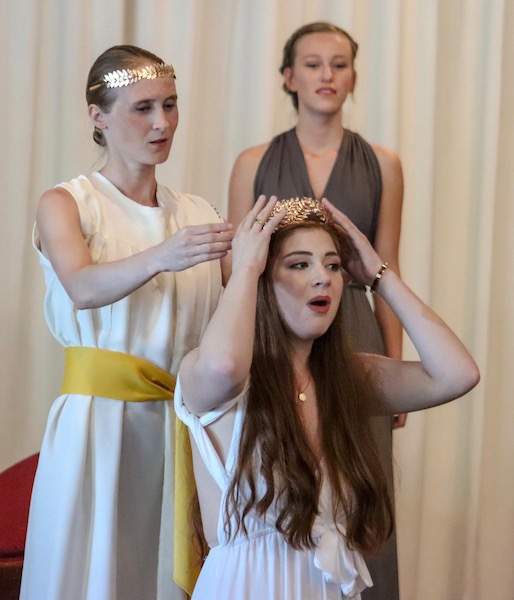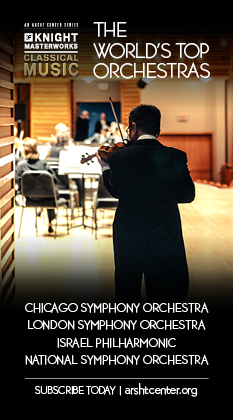Miami Music Festival goes for Baroque with a brilliant “Poppea”

Yuliia Billa (left) as Nerone and Kira Neary as Poppea starred in Monteverdi’s “The Coronation of Poppea” Saturday at the Miami Beach Woman’s Club. Photo: Angelica Perez
Baroque opera is rarer than floods in South Florida, which made the Miami Music Festival’s performance of Claudio Monteverdi’s L’Incoronazione di Poppea (The Coronation of Poppea) on Saturday afternoon doubly welcome.
Director Marc Callahan turned the unconventional venue of the Miami Beach Woman’s Club into an asset, devising a brilliant production of remarkable dramatic intimacy. There was plenty of promising talent among the cast of young opera apprentices and studio artists, most of who are still studying at music schools and conservatories.
With chairs arranged in a semicircle, similar to 17th century Venetian theaters of Monteverdi’s day, Callahan utilized the room’s entire space. The stage platform encompassed the royal boudoir with a long cloth spread through the room acting as a path to the chamber. At times the singers were literally inches from the audience. Other than the bed, there were no sets but the unaccredited Hollywood style Roman costumes proved effective. Opening and closing with a stylized tableaux of all the principal characters, Callahan’s production emphasized the hunger for power of the Roman elite.
Monteverdi’s final operatic masterpiece is unique in its depiction of lust, ambition and immorality. None of the characters are without human flaws. In the case of the Emperor Nerone and the conniving courtesan Poppea, evil plotting seemingly knows no boundaries. The philosopher and court advisor Seneca comes closest to principled goodness and he is ordered to commit suicide by poison. Monteverdi’s glorious music manages to bring depth and passion to this tale of Poppea’s rise to empress of Rome, and the final duet is one of the great moments in music of the Baroque era.
While this abridged version (clocking in at just over two hours minus intermission) omitted some characters and great music, it had the virtue of fluidity and astute theatrical pacing. With electric keyboard and cello acting as continuo on one side of the narrow space and two violins and viola on the other, Elaine Rinaldi conducted a stylish, invigorating performance that bristled with drama. With excellent playing, this was vivid musical theater devoid of stodgy tempos or eccentricities.
As Poppea, Kira Neary combined shrewd dramatic instincts with a sizable soprano of striking beauty. She infused every scene with her force of personality and her deft coloratura easily encompassed the trills and roulades. This young soprano, currently a student at Northwestern University, is definitely a singer to watch.
The role of Nerone is often sung by a countertenor or tenor. Soprano Yuliia Billa proved an interesting casting choice and she delivered a commanding portrait of the emotionally unstable emperor. Her fierce, incisive declamation turned to fire in the tense scene between Nerone and Seneca (who advises the monarch against banishing the empress Ottavia in favor of Poppea). Her warm timbre and clean articulation brought tenderness to the love scenes, but this Nerone could turn harsh and violent with his mistress. Her full-throated order to Ottavia to leave Rome was stunning in sheer dramatic impact. The wonderful blending of Neary and Billa’s voices in the concluding duet climaxed their vivid theatrical and vocal portrayals.
In Callahan’s version, the goddesses of fortune, virtue and love are a constant presence, often directing the action and singing some of the music that Monteverdi conceived for courtiers and Seneca’s disciples. Sophia Formella (La Fortuna), Elizabeth Stamerra (La Virtú) and Madison Williams (Amore) were a fetching trio, cavorting about the playing space and singing with pointed energy.
Joined by the sweet toned Jui Han Sung as Venus, their vocalism and saucy depictions offered charm and energy. Williams, in particular, revealed an enticing high soprano and danced with the grace of a ballerina. Stamerra’s scene with Seneca as she delivers Nerone’s order to end his life brought out the color in her attractive lower range. In Callahan’s staging La Virtú was clearly the loser in this battle of wills and her fellow goddesses let her know it.
Ideally Seneca requires a deep basso profundo. Christian Kas was a baritone with smooth vocal production but he merely approximated some of the low notes .The well-placed countertenor of Riley Wells effectively brought some sympathy to the thankless role of Ottone, Poppea’s former lover who attempts to kill her.
Erin Oakley’s bright soprano enlivened Drusilla, Ottone’s lover who joins him in leaving Rome after he is stripped of his nobility and wealth. Annika Rose Bell brought tragic grandeur to Ottavia, the banished empress. Bell’s gasping for breath as she began her “Addio Roma” soliloquy offered one of the production’s most gripping moments.
The role of Arnalta, Poppea’s maid is usually sung by a tenor or countertenor dressed as a woman but the warmth of Hannah Lawrence’s feminine sound gave the role focus rather than making it a comedic interlude. Her aria celebrating Poppea’s ascension to the throne was rendered with bold phrasing and finesse. The appealing edge in Ruby Pierce’s high soprano turned Valletto into a major character.
Despite the inevitable compromises of the venue and cuts in the score, this was a winning realization of one of the monuments from the cradle of operatic theater. Happily the Miami Music Festival will continue its exploration of Baroque opera with Lully’s Armide in July.
The Miami Music Festival repeats The Coronation of Poppea 6 p.m. Sunday at the Miami Beach Woman’s Club, 2401 Pine Tree Drive in Miami Beach. Lindsay Greene sings Poppea and Carissa Casalino plays Nerone. miamimusicfestival.com
Posted in Performances
Leave a Comment
Sun Jun 30, 2019
at 12:27 pm
No Comments



